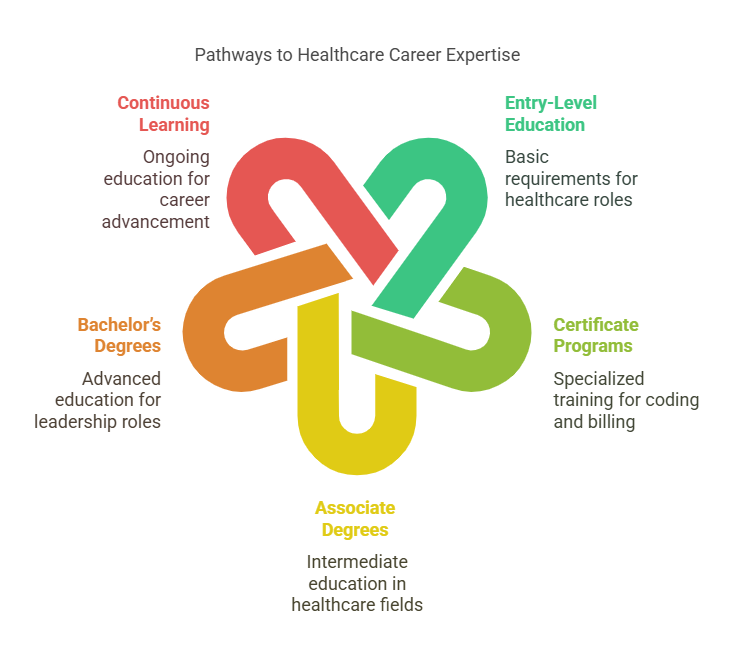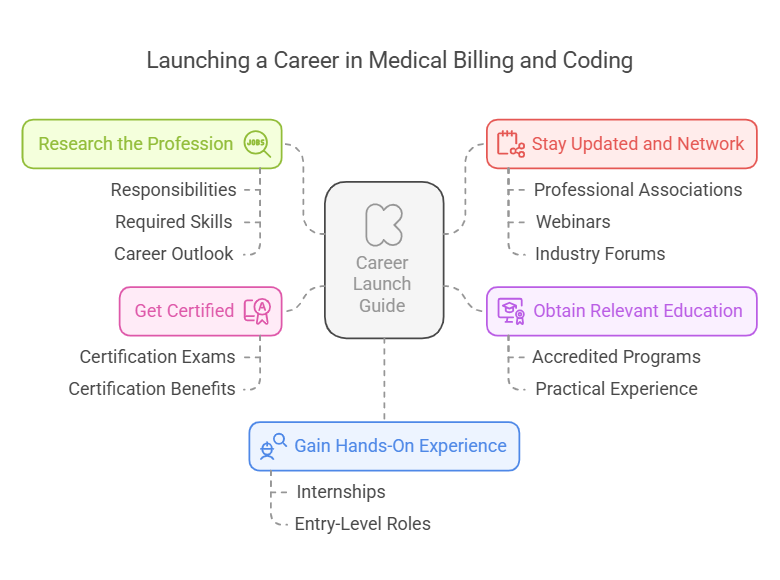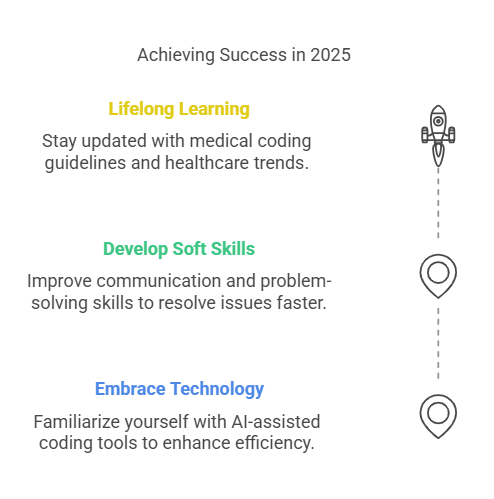Coding and Billing Specialist
Medical billing and coding specialists are the backbone of the healthcare revenue cycle, ensuring providers get reimbursed accurately for their services. With evolving healthcare regulations, digital advancements, and growing demand for healthcare services, the skills required to excel in this field have shifted significantly. Obtaining a medical billing and coding certification is essential for those aiming to enhance their expertise and credibility in the industry. If you aim to become a top-tier medical coding and billing specialist in 2025, this comprehensive guide will provide the insights you need to stand out, thrive, and achieve long-term success.
Key Insights for Future-Proof Success
Medical billing and coding specialists play a pivotal role in healthcare financial management.
Precision, adaptability, and technical proficiency are essential skills to excel.
Industry certifications and ongoing education are crucial for career growth.
Remote work opportunities have increased, creating flexible career options.
What Does a Medical Coding and Billing Specialist Do?
A medical coding and billing specialist translates complex healthcare services into standardized codes for insurance claims. This ensures that healthcare providers receive timely, accurate payments while maintaining meticulous patient records.
Core Responsibilities:
Medical Record Analysis: Interpreting and coding diagnoses, treatments, and procedures using standardized code sets like ICD-11, CPT, and HCPCS.
Insurance Claim Management: Preparing, submitting, and following up on claims to ensure proper reimbursement.
Regulatory Compliance: Staying updated with changes in healthcare regulations, including HIPAA and CMS guidelines.
Billing & Revenue Cycle Management: Collaborating with healthcare providers and insurance companies to streamline billing processes.
Accurate coding isn’t just about billing; it ensures proper patient care documentation and supports public health research by providing reliable data.
External Resource: Learn more about HIPAA regulations at HHS.gov.
Must-Have Skills to Thrive in Medical Coding and Billing in 2025
1. Attention to Detail
Medical coding and billing leave no room for error. A single mistake can cause claim denials, delayed payments, or even legal complications. Specialists need a sharp eye for details to ensure every code accurately reflects the services provided.
Pro Tip: Develop a habit of cross-checking work and using audit tools to catch mistakes before submission.
2. Mastery of Medical Terminology
Understanding medical jargon, anatomy, and pharmacology is critical. It helps coders interpret patient records correctly and assign appropriate codes.
Helpful Resource: Explore medical terminology basics through MedlinePlus.gov.
3. Proficiency in Medical Coding Systems
Medical coders must master code sets like:
ICD-11: For diseases and health conditions.
CPT: For medical procedures and services.
HCPCS Level II: For supplies, equipment, and other services.
4. Technical Skills and Software Proficiency
Billing and coding specialists must navigate Electronic Health Records (EHR) systems and specialized billing software like Epic, Cerner, and Kareo. Familiarity with data analytics tools is increasingly important for tracking revenue cycle metrics.
5. Problem-Solving and Communication
Medical coders often collaborate with healthcare providers and insurance companies to resolve discrepancies. Clear communication and analytical thinking help solve these issues efficiently.
6. Knowledge of Healthcare Regulations
Staying compliant with evolving rules, like CMS updates and state-specific regulations, is non-negotiable. Continuous education ensures professionals stay ahead of regulatory changes.
Stay Informed: Visit CMS.gov for the latest Medicare and Medicaid updates.
Educational Pathways: From Novice to Expert
1. Entry-Level Education Requirements
Most employers require a high school diploma or equivalent. However, candidates with postsecondary education in healthcare administration or medical coding have a competitive edge.
2. Certificate and Associate Degree Programs
Programs like the Certified Professional Coder (CPC) or Certified Billing and Coding Specialist (CBCS) teach core skills, including:
Anatomy and physiology
Medical coding systems
Healthcare documentation
3. Bachelor’s Degree in Health Information Management
For those aiming for leadership roles, a bachelor’s degree offers comprehensive knowledge of healthcare operations, data analytics, and regulatory compliance.
4. Continuous Learning & Micro-Credentials
In 2025, micro-certifications in specialized areas like telehealth coding or cybersecurity for healthcare records will provide a significant advantage.
Pro Tip: Enroll in accredited programs recognized by AHIMA or AAPC for maximum career benefits.
The Impact of Certifications on Career Growth
Medical billing and coding certifications validate your skills and open doors to better-paying positions.
Top Certifications to Pursue:
Certified Professional Coder (CPC) – AAPC
Certified Coding Specialist (CCS) – AHIMA
Certified Billing and Coding Specialist (CBCS) – NHA
Certified professionals consistently earn higher salaries and enjoy better job security compared to their non-certified peers.
Learn More: Check the official certification guidelines on AHIMA.org.
Emerging Trends Reshaping Medical Coding and Billing in 2025
1. Artificial Intelligence and Automation
AI-driven coding tools are transforming the field by reducing manual entry tasks and improving accuracy. Professionals who understand how to collaborate with these technologies will be in high demand.
2. Remote Work Opportunities
The pandemic accelerated the shift to remote work, and the trend continues. Medical coders can now work from home for hospitals, insurance companies, or even as independent contractors.
3. Telehealth Services Integration
Telehealth services have skyrocketed, requiring new codes and billing procedures. Coders must stay updated with evolving guidelines for virtual care reimbursement.
4. Data-Driven Insights
Medical billing data is increasingly used for strategic decision-making in healthcare. Coders familiar with data analytics tools can contribute to performance improvements and cost management.
Career Opportunities and Work Settings
Medical coding and billing specialists enjoy diverse career opportunities across various healthcare settings.
1. Hospitals and Healthcare Systems
About one-third of coders work in hospitals, often specializing in areas like oncology or emergency care. These positions typically offer competitive salaries and benefits.
2. Outpatient Clinics
Doctors' offices, urgent care centers, and specialty clinics employ medical billers to handle outpatient services. These roles may offer greater schedule flexibility.
3. Insurance Companies
Insurance providers hire coding professionals to assess claims, identify fraud, and optimize payment processes.
4. Government Agencies
Agencies like the CDC and VA need coders to process medical claims and support public health initiatives.
Insight: Explore federal job listings on USAJobs.gov.
5. Freelance and Remote Positions
Freelance medical coders enjoy schedule flexibility and can work for multiple clients, making this an appealing option for experienced professionals.
Salary Expectations and Growth Potential
Average Salary in 2025
The median salary for certified medical coders is projected to exceed $52,000 annually, with top earners making over $70,000 depending on experience, location, and certifications.
Factors Influencing Salary:
Geographic region
Certification level
Years of experience
Specialization (e.g., oncology, cardiology)
Job Market Outlook
The U.S. Bureau of Labor Statistics predicts a 15% growth in medical coding jobs by 2030, driven by increased healthcare demand and the ongoing digitization of medical records.
Step-by-Step Guide to Launching Your Career
Step 1: Research the Profession
Understand the responsibilities, required skills, and career outlook. Resources like AHIMA and AAPC provide valuable industry insights.
Step 2: Obtain Relevant Education
Enroll in accredited medical billing and coding programs that offer practical experience.
Step 3: Get Certified
Pursue industry-recognized certifications to enhance your employability.
Step 4: Gain Hands-On Experience
Internships and entry-level roles provide practical exposure to medical coding tasks.
Step 5: Stay Updated and Network
Join professional associations, attend webinars, and engage with industry forums to stay informed about new developments.
Practical Tips for Success in 2025
Embrace Technology: Familiarize yourself with AI-assisted coding tools.
Develop Soft Skills: Effective communication and problem-solving abilities help resolve claim issues faster.
Commit to Lifelong Learning: Stay current with medical coding guidelines and healthcare trends.
Final Thoughts
Becoming a medical coding and billing specialist in 2025 requires more than just technical knowledge. It demands a proactive approach to learning, adaptability to technological advancements, and a commitment to precision. By honing your skills, obtaining relevant certifications, and staying attuned to industry changes, you can position yourself as a sought-after expert in this essential healthcare field.
Start today, invest in your education, and step into a rewarding career that bridges the gap between healthcare services and financial success.









